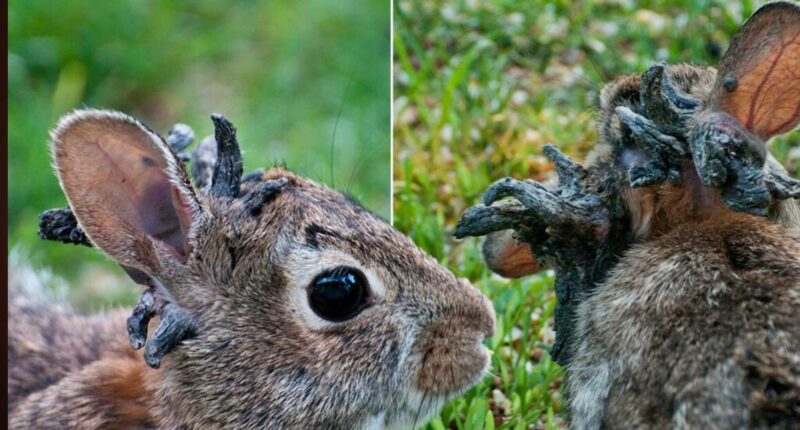Share this @internewscast.com
Fort Collins, Colorado, is abuzz with intrigue and astonishment as locals have spotted rabbits with bizarre, horn-like protrusions. These animals, termed “Frankenstein bunnies” and “zombie rabbits,” have become an online sensation due to their peculiar appearance.
However, a scientific reason exists behind this strange phenomenon, one intertwined with folklore, medical discovery, and a virus that is decidedly natural. Here’s the insight.

What’s Causing the “Horns” on These Rabbits?
The peculiar growths stem from the Shope papillomavirus, a disease initially discovered in the 1930s. It spreads through fleas, ticks, and mosquitoes and causes wart-like growths that can develop into horn-like extensions. Though unnerving, experts assure that the virus poses little risk to wild rabbits unless the growths impede their vision or ability to eat.
Kara Van Hoose, a Colorado Parks and Wildlife spokesperson, explains:
“The virus manifests as wart-like protrusions on their face—sometimes they appear as tiny nodules, other times as larger structures resembling tentacles or horns.”
Resident Susan Mansfield described one infected rabbit:
“It resembles black quills or black toothpicks erupting all around its mouth. I assumed it would perish in the winter, but it survived and appeared the following year with even larger growths.”
From Folklore to Fact: The Jackalope Connection
This virus is not a recent discovery—it’s thought to have inspired the legendary jackalope, a creature from North American folklore said to be a cross between a rabbit and an antelope. Dr. Richard Shope’s studies in the 1930s also helped reveal HPV’s association with cancer.
:max_bytes(150000):strip_icc():focal(749x0:751x2)/_papilloma-virus-rabbit-1-081325-928d69730375482fa07f1770899c5d09.jpg)
Social media users have amplified the bizarre sightings with creative nicknames:
“This is how the zombie virus starts.” – Instagram user
“We’ve got freaking zombie rabbits now?!” – YouTube comment
Despite the horror-movie comparisons, Van Hoose reassures:
“Nature is metal, and this can be kind of cool looking on different rabbits.”
Should Humans Be Worried?
The virus does not spread to humans, pets, or other wildlife. However, officials warn against touching infected rabbits, as interference can stress the animals.
Domestic rabbits face greater risks, as the virus can escalate into aggressive cancers. Veterinarian Thomas M. Donnelly notes:
“The majority [of domestic rabbits] develop invasive epidermoid carcinomas, which are typically fatal.”





